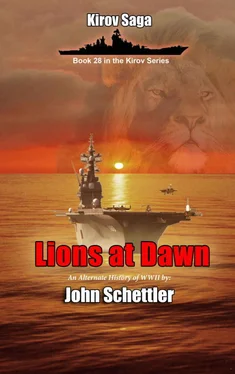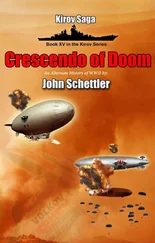Stealth was a physical thing, built into the structure and design of the aircraft itself. It was achieved by design angles and exotic materials, and in this case, it worked exactly as planned. The Japanese did not have the better US standoff weapons, but the planes had gotten in close enough to deliver what they had in the magazines.
Seconds passed, and Karpov suddenly realized in one awful moment that his ship was dead. 64 Wolfhounds…. He had fought them in the simulators, battling the soft phosphor glow on the battle screens, but never once beat more than 30 incoming weapons. As good as the missiles were beneath that forward deck, the sheer mass of the attack would always see at least one or two bombs get through. This time those odds were doubled down, impossibly long, 64 wolfhounds!
In a split second his mind did the one thing it had always done when pressed into an impossible corner. His hand was moving to the missile key around his neck before he even reached a certain conclusion in his thoughts. At the same moment, he turned to Grilikov, pointing at him with two fingers extended on his right hand. It had been a pre-arranged signal between the two men, and as Karpov reached Samsonov’s station, Grilikov stood, a vast looming presence there, and pulled a second missile key from a chain around his neck.
“Samsonov—Moskit II, bank four, missile number sixteen. Program it for high altitude profile. Here is your target.” Karpov tapped the screen, indicating where he wanted the missile directed.
“Aye sir.”
Fedorov stood there, suddenly realizing what was happening. Karpov was already inserting his missile key into the CIC panel, the first authorization to fire the weapon in question, Grilikov’s big hand was right next to his, the devil and his deep dark shadow, side by side.
“On my mark…”
“What are you doing Karpov?”
“Not now Fedorov! Grilikov, turn!”
Both men rotated their keys, and the board lit up. It winked red three times, then went yellow as the missile accepted and acknowledged the attack profile that Samsonov had sent to it. A second later it went green, indicating it was ready to fire. Karpov did not hesitate one second more. He flipped up the protective plastic key mask, and pushed his thumb firmly down to fire the missile. The klaxon of doom sounded loudly, deep and jarring amid the whooshing hiss of the Klinok missiles that were still firing. Then one of the larger forward hatches opened on that long red deck, and the Sunburn was up in a roar of angry fire, climbing into the sky.
Fedorov was slack jawed. Karpov had given him the second missile key, and he instinctively reached to feel for it, finding it was still there on the chain around his neck. But Karpov had given Grilikov a third key, insurance that any fire order he would give would certainly be obeyed. Fedorov knew exactly what had happened here, chiding himself for thinking Karpov was a leopard that could ever change his spots. That number sixteen missile was carrying a nuclear warhead.
“Set missile for manual detonation,” said Karpov, and Samsonov toggled a switch, his thick finger poised, eyes on the Admiral, the first glimmer of fear awakening there. The CIC Chief knew exactly what Karpov was doing, and if his commanding officer had to resort to such measures, Samsonov knew the ship was now in the gravest possible danger.
The seconds ticked off, the Sunburn raged into the sky. Karpov took a deep breath and looked at Rodenko, who was watching him closely now. “EMCON,” he said. “All systems dark.”
“All systems dark, aye sir.” Rodenko repeated, instinctively knowing what Karpov was doing. If the weapon produced an EMP burst, the chance their electronics would receive damage was lessened when they were toggled off. For good measure, Rodenko put the system into Shield Mode, cross circuiting to a different set of relays that were highly shielded against EMP.
Then Karpov watched the Plexiglas screen, seeing the fast track of his killer missile about to reach the long string of inbound ordnance. He looked down at Samsonov and gave the final order.
“Detonate warhead.”
Everyoneon the bridge shirked when it went off. Karpov instinctively raising a hand to shield his eyes. He had fired the Moskit II with a 200 Kiloton warhead at the northern group of Wolfhounds, and the massive fireball, even fifty nautical miles away, dominated the entire seascape now. The blast was sufficient to destroy or divert the entire group of 32 smartbombs, consumed by the shock and fire of that terrible nuclear detonation.
There came a quavering sound on the air, and a little later the shock wave hit the ship, rattling equipment all over the bridge. The crew were now mesmerized by the display in the sky, and Karpov realized it was the first time they would have seen such a thing. That was not the case for him. He had thrown his first warhead at his enemies long ago, in the cold north Atlantic, the end of the American battlegroup that had been centered on the battleship Mississippi . Having seen what such a blow could accomplish, he fired his second special warhead in 1945, destroying, among other things, the vaunted battleship Iowa .
The quavering sound became a wind, dark, soulless, passing over the ship like a banshee. A strange glow surrounded them, and for the briefest moment, Karpov, looking at Fedorov, saw the other man vanish. An instant later Fedorov was still there, his face pallid and eyes wide as he looked around, struggling to determine what was happening.
There came a groaning sound, a low counterpoint to the last missile sent off by Kirov before Karpov turned to Samsonov and ordered him to cease fire. Now all of Fedorov’s dire warnings presented themselves in Karpov’s mind. Time was fractured, unstable, prone to increasing damage by the power of massive detonations like the one Karpov had just set off, twenty times bigger than the bombs at Hiroshima or Nagasaki The sound deepened, descended, and Karpov seemed to feel as though he were riding a fast moving elevator. Slowly, the feeling subsided. He needed to know what was happening.
“Rodenko. Light us up again. I need to know what’s out there.” He looked at Fedorov, then tapped Grilikov’s arm, nodding his head to the man as if to say “at ease.” He walked slowly towards Rodenko’s station, one eye on Fedorov. Both men would have information he needed, but Rodenko’s status report was his first concern.
“I have nothing, sir,” said Rodenko. “I cross circuited to shielded systems before the detonation, and so I’m certain my system is functioning, but I read no contacts—not even the two KA-40s. We’ve lost our data link.”
“I neglected to have Nikolin put them into EMCON mode,” said Karpov. “They might have suffered EMP damage, and as our primary line on Takami was being fed by their radars, that could account for this situation.”
“But we should still be reading those Wolfhounds at 45 degrees,” said Rodenko. “Fregat could see those clearly enough inside sixty miles.”
Yet they were gone. Karpov had killed half the Wolfhounds with his 200 Kilotons of nuclear rage, but the others had simply vanished.
“Could they have been affected by the detonation?”
“They were well to the east, sir. Over 50 nautical miles, just as we were. For that matter… Where’s the goddamned fireball…” Rodenko was staring out the forward viewport, away from his screen now as he just realized his system wasn’t even seeing that fireball any longer. Then, even as he looked, he saw a soft glow in the distance, burning brighter, second by second, and by degrees, the fireball reappeared. He could see it in the sky, using nothing more than the old reliable Mark 1 Eyeball. Yet the top of the cloud had been sheared off by prevailing upper winds, a long ocher smear in the sky.
Читать дальше












